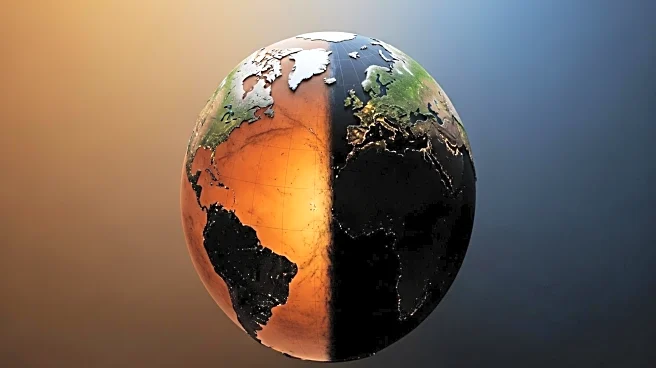What is the story about?
What's Happening?
Colombia has expelled Israeli diplomats and suspended its free trade agreement with Israel after the interception of the Sumud flotilla bound for Gaza. Colombian President Gustavo Petro announced the decision, citing the arrest of two Colombian citizens involved in the flotilla. The flotilla's interception has sparked widespread protests across Europe, with demonstrations occurring in cities such as Rome, Madrid, and Dublin. Turkey has launched a criminal investigation into the incident, accusing Israel of violating international law. The flotilla aimed to deliver humanitarian aid to Gaza, and its interception has drawn condemnation from various international leaders and organizations.
Why It's Important?
The expulsion of Israeli diplomats by Colombia and the subsequent international protests highlight the growing tensions surrounding Israel's actions in Gaza. This development could impact diplomatic relations between Israel and several countries, potentially affecting trade agreements and international cooperation. The incident underscores the ongoing humanitarian crisis in Gaza and the global call for increased aid and support for the region. Countries like Spain and Turkey have condemned Israel's actions, emphasizing the need for peaceful resolutions and humanitarian efforts. The situation may influence international policy decisions regarding aid distribution and diplomatic engagements with Israel.
What's Next?
The international community is likely to continue monitoring the situation closely, with potential diplomatic repercussions for Israel. Countries involved in the flotilla may seek further action or negotiations to ensure the safety and release of detained citizens. The protests and diplomatic responses could lead to increased pressure on Israel to address the humanitarian needs in Gaza and reconsider its approach to international aid efforts. The incident may also prompt discussions on international maritime law and the rights of humanitarian missions.
Beyond the Headlines
The interception of the flotilla raises ethical questions about the balance between national security and humanitarian aid. The global response reflects a broader concern for human rights and the treatment of civilians in conflict zones. The incident may influence future humanitarian missions and the strategies employed by activists to deliver aid to regions under blockade. It also highlights the role of international solidarity movements in advocating for the rights of marginalized communities.















